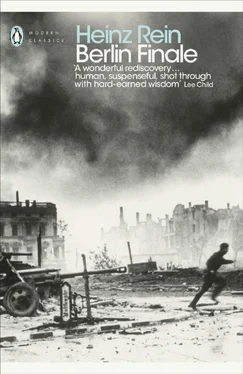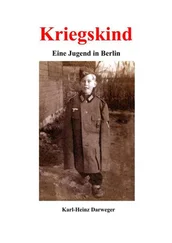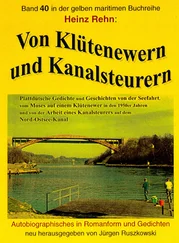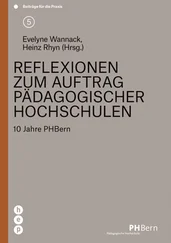But Eckert is not in a mood to answer questions, the questions he needs to ask burn within him. He carefully slides himself back against the cushion. ‘My name is Eckert,’ he says.
Dr Wiedemann looks at him quizzically.
‘Eckert, Max Eckert from Reinickendorf,’ Eckert repeats. ‘My daughter is a patient of yours, Doctor.’
‘Right,’ says the doctor. ‘Now I understand.’ He looks closely at Eckert. Fluxus salinus, he thinks, so this is the father. ‘And what brings you to me at this late hour?’ he asks.
Eckert takes a deep breath. At last he has reached his goal, he doesn’t yet guess that it is only a stage on the way. With short, hurried words, without full stops or commas, he tells his story.
Dr Wiedemann has been listening to him quietly without interrupting him. ‘Yes, your wife was here at my surgery with your daughter this morning, Mr Eckert,’ he says when Eckert says nothing. ‘I had your daughter under the sun-ray lamp and gave her an injection of Detoxin. Your wife was in a great hurry, because the arrival of the bombing units had already been announced, she left here at about a quarter past eleven, and she probably didn’t make it home because the sirens were already going off about ten minutes later. She might have sought refuge in a bunker somewhere, or in the underground.’
Dr Wiedemann studiously avoids mentioning the fact that a bomb has crashed through the roof of Moritzplatz underground station and killed an as yet unknown number of people who were standing inside the station, neither does he mention that after the first wave of bombers the whole district between Moritzplatz and Köpenick Bridge, Hallesches Tor and Friedrichstrasse Station was in flames, and that during the very minutes when people were escaping from the basements of the burning houses and factories and into the streets the second and third wave were flying in and once again dropping enormous explosive and incendiary payloads on the same target area.
‘At about sixteen-thirty hours my wife and my daughter were not yet home, Doctor,’ Eckert says, agitated. ‘Something has happened, I can sense it like a certainty in my blood.’
‘Calm down, Mr Eckert,’ Dr Wiedemann reassures him. ‘Perhaps your wife was so upset by the raid that she stayed with friends.’
‘We don’t know anyone around here,’ Eckert remarks curtly.
‘Or perhaps she couldn’t face the long walk,’ Dr Wiedemann says, trying to diminish his fears.
Eckert won’t have any of that, either. ‘Think about it, Doctor, four and a half hours after the alarm they still weren’t home,’ he says urgently. ‘Four and a half hours!’
‘There is little point engaging in speculation,’ Dr Wiedemann observes. ‘But while you have been out and about, your wife may have come home, it’s after half past nine. So you have been out for more than three hours. While you are talking to me here, she may be sitting at home worrying about you.’
Eckert sits up stiffly. That possibility hasn’t even occurred to him, he has roused himself into too great an anticipation of disaster. ‘That may be so,’ he says quickly, takes his legs off the sofa and stands up.
‘Where are you going now?’ Dr Weidemann asks.
‘Home,’ Eckert replies. ‘That should be obvious.’
‘Out of the question,’ Dr Wiedemann contradicts him forcefully. ‘In this state, in the middle of the night? Haven’t you had enough trouble getting here?’
The battle between going and staying lasts for several minutes, in the end Dr Wiedemann wins, after promising to take Eckert to Reinickendorf in his car early in the morning. He secretly stirs a powerful dose of bromide into the coffee, and it isn’t long before Eckert is sound asleep. Dr Wiedemann is a doctor whose job is also a deep calling, and for whom suffering human beings are not divided into private patients and members of the public health scheme. Of course it is not only his humanity that is the crucial factor, there is also his special medical interest, as he graduated with a dissertation about dermatitis with particular reference to fluxus salinus, weeping eczema, but he can hardly be blamed for that, it is only active in his unconscious, because he has realized that Eckert has entered a severe mental and psychical depressive state, that an almost manic compulsion is threatening to explode from within, and he has made up his mind to treat the man quite delicately.
At seven o’clock the next morning, while Eckert is still fast asleep, Dr Wiedemann gets his car from the garage, which has remained miraculously unscathed in the middle of all the destruction, and then, as promised, drives Eckert to Reinickendorf. To reach Residenzstrasse he has to take an enormous detour, via Schöneberg, Friedenau, Charlottenburg and Moabit, as the previous day’s attack has caused unimaginable damage and deviations keep sending the car further and further west. They don’t reach Residenzstrasse until about nine o’clock. Dr Wiedemann goes up to the flat with Eckert, now feeling uneasy himself. Even if Ursula Eckert is only one of his many patients, she and her mother, who has always come with her, are after all people that he knows personally, and a personal fate always speaks to one more directly than the most terrible misfortune on a mass scale.
Eckert’s hands are trembling so badly that he can’t open the door to the flat. Dr Wiedemann takes the key from his hand, unlocks the door and pushes it violently open. With a few glances he can tell that the flat is empty: Frau Eckert and her daughter have still not come back. He knows what that means, and it is quite clear from Eckert’s face that he does too. Still he tries to offer him some words of comfort, but Eckert doesn’t even listen to him, he takes a few quick steps through the flat, stands reflecting for a moment in the kitchen, mechanically straightens a chair and then resolutely leaves the room.
He doesn’t say a word as they go down the stairs side by side. He doesn’t rush down the stairs, his hands are plunged deeply into his coat pockets, and he carefully takes one step at a time, but that slowness is itself stranger than raving and shouting. Only when Dr Wiedemann opens the car door does Eckert voice the request to be driven back again. Dr Wiedemann doesn’t dare refuse him, he also thinks it right not to leave the petrified-looking man on his own for now. On the way back to Ritterstrasse Dr Wiedemann tries several times to engage Eckert in conversation, but it doesn’t work, so in the end he lets it be. When the doctor stops on the corner of Ritterstrasse and Prinzenstrasse to allow a procession of firemen to pass, Eckert quickly opens the door, gets out, nods fleetingly at the doctor and flings the door shut behind him. It happens with such swift and skilled movements, of which Dr Wiedemann would not have thought this rather awkward and measured man capable, that he is taken by surprise and unable to hold him back. He just catches sight of Eckert resolutely heading straight for the field of rubble.
And now begins the odyssey of tram conductor Max Eckert, on 4 February 1945, the day after the most annihilating air raid by the Americans on Berlin. Admittedly the ruined district has been closed off within a wide radius, but Eckert is still able to penetrate the devastated streets, his conductor’s uniform stands him in good stead. He is clear that there is only one possibility now of his wife and his daughter being alive, which is that they are locked in some basement somewhere. In Schmidstrasse, near the intersection with Neanderstrasse, a bulldozer is at work because there are thought to be living people under the rubble. Eckert crosses the area between Köpenicker Strasse and Moritzplatz, but again and again he returns to the bulldozer and watches as the sharp jaws of the grabber eat their way into the mountains of rock, swing round and spew out their bites to the side again. He pursues the progress of the work very closely, he is often in Schmidstrasse, and normally travelling. What he only vaguely perceived during the night, what could only be guessed at in the darkness, is now, with bright daylight falling down upon it, revealed as an inferno of unparalleled horror. Among the collapsed and still-burning houses are shattered trams, cars and lorries, dead humans and horses lie on the ground, body parts, mortal remains, heads without bodies, bodies without heads, trunks without legs, legs without trunks, undefinable piles of burnt, charred, shredded human flesh, desperate, wailing, half-crazed people are wandering around, many of them staring with uncomprehending eyes and pointing feebly at the smoking, crushed, devastated buildings which barely twenty-four hours ago still provided shelter and warmth and a pitiful remnant of independent life, some dash through smoke-filled doors and climb on unsteady walls to secure the wretched remains of their possessions from the piles of rubble.
Читать дальше












